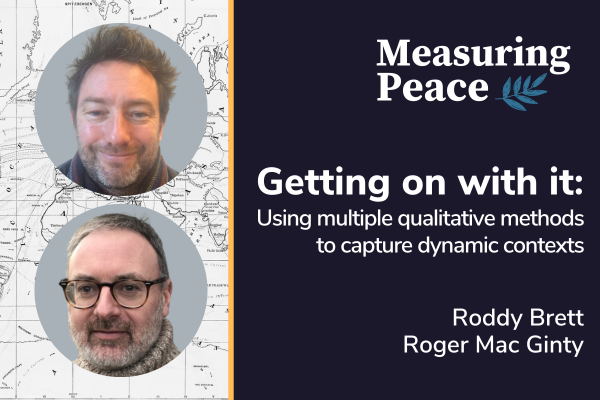
This program is co-sponsored by the Mershon Center for International Security Studies, Corrymeela Community, Northern Ireland Executive, Ulster University, and University of Bradford
This presentation and discussion draws on the "Getting on with it: Understanding the micro-dynamics of post-accord intergroup social relations". The project seeks to examine micro-group dynamics in localities in Colombia, Lebanon and Northern Ireland and has used a number of field research methods to try to capture these dynamics. The presentation and discussion will cover the journey from initial desk-based proposal that included a research design to the challenges of conducting research in contexts that present challenges in terms of logistics, security and other factors that demand an agile approach to methodology.
Speakers

Roddy Brett is Associate Professor in Peace and Conflict Studies at the School of Sociology, Politics and International Studies at the University of Bristol. His research addresses the study of armed conflict and political violence (including genocide), the impact/legacies of these phenomena and the strategies employed to overcome said violence (transitional justice, peacebuilding).
- Section Editor, International Relations, The Journal of Perpetrator Research
- ‘Embodied reconciliation: a new research agenda’ (R. Brett, R. English, E. Féron, V. Rosoux). In Peacebuilding, early Online Published Version (2022).
- ‘Victim-Centred Peacemaking: the Colombian Experience’. In Journal of Intervention and Statebuilding, early Online Published Version (2022).
- ‘In the Aftermath of Genocide: Guatemala’s Failed Reconciliation’. In Peacebuilding, early Online Published Version (2022).
- Principal Investigator, Understanding the Micro-Dynamics of Post-Accord Intergroup Social Relations ESRC Research Grant

Roger Mac Ginty is Professor at the School of Government and International Affairs, and Director of the Durham Global Security Institute. He is co-founder of the Everyday Peace Indicators, and his latest book "Everyday Peace: How so-called ordinary people can disrupt violent conflict" was published by OUP in 2021.
- Editor, Peacebuilding
- Everyday Peace, Winner of the 2020-2022 Ernst-Otto Czempiel Award for best book on Peace
- Conflict Disruption: Reassessing the PEace and conflict System (Open Access)
- Bottom-Up Peace: The Everyday Peace Indicators Project (YouTube)
About Measuring Peace
Is peace measurable? This presentation series brings together researchers, practitioners, and policy specialists across disciplinary backgrounds to explore the diverse and myriad ways in which peace is defined and studied.
Working from an internationally recognized Peace Studies paradigm rooted in the social sciences, Measuring Peace is premised on the belief that durable peace requires more than the absence of active conflict and violence. Rather, an enduring “positive peace” must be collaboratively cultivated through multi-level interventions on local, national, and global scales. Peace-building processes are therefore complex, non-linear, and highly fluid, and require comprehensive social, political, economic, and structural strategies.
Featured speakers in this series will present innovative approaches to the study and practice of peace around the world— and how scholarly research and analysis can help to shape effective policy and intervention strategies on the ground. Topics covered during the 2023-2024 series will include identifying micro-dynamic and everyday indicators of peace, tracking peace accord implementation, tackling paramilitarism, and promoting social healing.
Graduate students who attend at least 2 webinars and the all-day Everyday Peace Indicator workshop (https://www.everydaypeaceindicators.org/) with Dr. Roger MacGinty in March 2024 will receive a Mershon Certificate in Measuring Peace.
Guiding Questions for this Series:
- What does it mean to assess peace? What kinds of working definitions and analytical metrics can we set to make “peace” a discrete and measurable research subject?
- Which kinds of inter/disciplinary research methodologies are most generative for doing peace research? What are the benefits and limitations of different models?
- How can we productively speak to and across historically- and geographically-specific cases of violent conflict in order to make broader claims about what it means to achieve peace?
